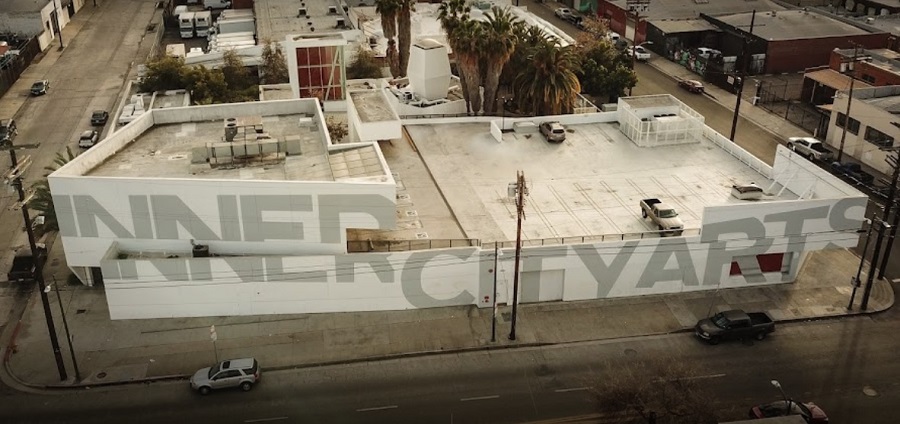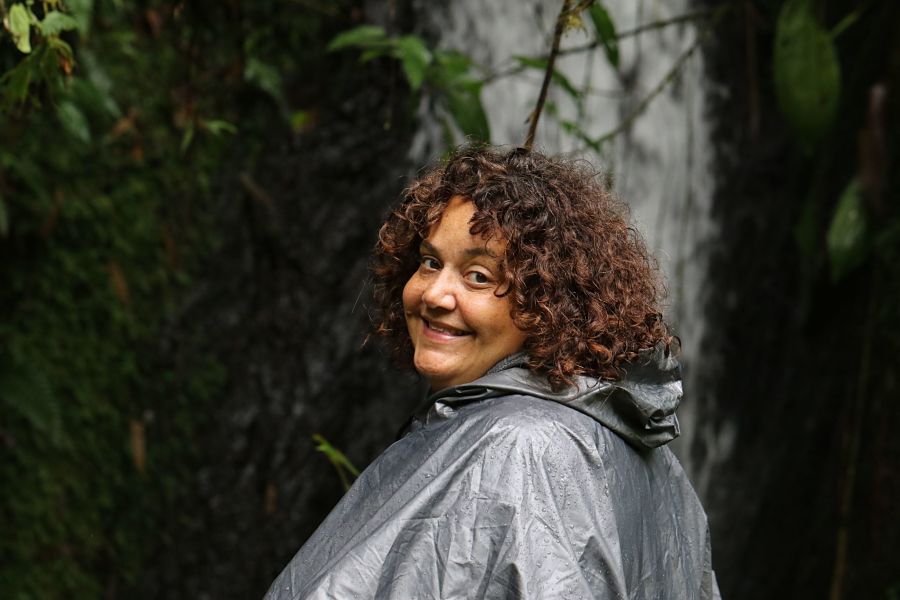Nineteen months ago, my big brother José, my everything, suffered multiple strokes due to complications from COVID. I’ve never had an easy life, and the theatre was how I found an escape and a way of healing. But COVID shut everything down. There were no roles to audition for. There was no show to produce at my company, Hero Theatre, that could occupy my time so that I didn’t crumble from sadness.
Around this time, I heard that Patrisse Cullors and her colleagues at the Crenshaw Dairy Mart in Inglewood, Calif., were heading up a graduate program in environmental and social justice arts practice at Arizona’s Prescott College. I had read Patrisse’s book When They Call You a Terrorist: A Black Lives Matter Memoir. I knew that she was also a performance artist. I was desperate for an outlet for my creativity. Waiting to see if my brother would live had become unbearable; it was time to go back to school.
I found a community of compassionate teachers in Patrisse and Crenshaw Dairy Mart artists Jake Freilich, Noé Olivas, Star Montana, and Alexandre Dorriz. They understood the challenges their students faced due to the pandemic and the civil unrest spurred by police brutality and racism in this country.
I confided in Patrisse that as my company, Hero Theatre, was approaching its 10th year, I was experiencing burnout. Starting and running your own theatre company is such hard work. Add being a woman of color living on a theatre actor’s salary to that.
Also: How was I going to bring my small theatre company back from this pandemic?
Patrisse advised me to take some time off and discover a practice of self-care. She also encouraged me to create a project I was really passionate about and produce it at Hero. So as my heart ached over my brother’s deteriorating health, Nuestro Planeta was born.
Nuestro Planeta (“our planet” in Spanish, the first language spoken in my home) is a 10-year-long environmental justice new-works commissioning initiative. It is being supported through grassroots fundraising efforts, individual donations, travel support, and grants. Nuestro Planeta will comprise a series of plays and films centering on the relationship between Latine people and the Earth and focus on specific countries in Latin America, beginning with Colombia, Puerto Rico, El Salvador, Guatemala, and Mexico. The goal is to bring messages about climate change to vulnerable communities on personal, local, and global levels.
I wanted to start the project focusing specifically on Latin America because my heart longs to work with my community. When I work on Latine plays, we become familia. It isn’t perfect: Many of us are from disparate cultures and we definitely have our differences, but still, it feels like family.

Hero Theatre is in residence at the Rosenthal Theater at Inner-City Arts, located on Skid Row in downtown Los Angeles. Climate change is everywhere in California: We are plagued with wildfires, dangerously high temperatures, and severe drought. Black and Latine people are at increased risk, as we are often on the front lines of the labor force. We live in toxic neighborhoods, dig trenches, harvest produce, and manicure lawns, all in life-threatening environmental conditions.
In September 2020, Los Angeles temperatures reached 121 degrees. During that heat wave, a 73-three-year-old Mexican American man went to work digging cable trenches at a mobile home park in nearby Riverside County. After a few hours, he began to feel ill and returned home to a trailer that lacked air conditioning. His nephew found him that evening, lying in the dirt driveway. He had gone into cardiac arrest and died.
As our governor and representatives propose investing billions of dollars to fight climate change, are they also finding effective ways to bring vital messages of the climate crisis to poor communities of color? How do we invest in effectively educating communities so that they understand how to lessen their own human impact and take care of themselves too? What about investing in the arts as a way of delivering this vital information?
Climate change is something I began to care about when it directly affected me; I’m not ashamed to say that. When Hurricane Maria ravaged Puerto Rico, I was on the TCG Leadership U grant at the Oregon Shakespeare Festival. I remember spending an evening with Mildred Ruiz Sapp and Nancy Rodriguez, two Puerto Rican friends from the festival. None of us could get through to our families. The anxiety was too much for us to handle alone.
Because of the hurricane, my family in Puerto Rico lived for eight months with no electricity. It took even longer than that for them to have running water regularly. Water was being rationed in my mom’s village, and people had to reuse plastic containers to get their water supply.
For people who don’t believe that climate change was to blame for that hurricane, I suggest they dig deeper. A storm of that magnitude is more likely to occur now more than ever due to the warmer air and ocean water caused by global warming. Hurricanes, warming waters, and human impact also harm the island’s reefs. Some Puerto Ricans rely on reef systems for food and work. Abundant biodiversity attracts tourism, and that’s an industry that provides a lot of jobs to my people.
As part of Nuestro Planeta, I’ll be traveling with commissioned writers back to their ancestral homelands. I believe there is a healing that happens when we return to our land. We need to re-establish our connection to the Earth in a place where we are not seen as others.
Last month I traveled to the national parks of Colombia and the Amazon rainforest with our first commissioned writer, Diana Burbano. Connecting to the animals, nature, and Indigenous communities in the Colombian Andes and the Amazon was a transformative experience. Diana was born in Colombia and came to the States when she was very young. This was the first time she had ever visited these specific regions. I felt honored to share that experience with her.
In the Amazon village of Puerto Nariño, I befriended a young tour guide named Neider. He reminded me of my brother when he was younger. I asked him many questions about life in the Amazon, about deforestation, and about the endangered species of the Amazon. I was particularly curious about the pink river dolphins. Neider shared his concern that tourism was taking over the Amazon and that his people were losing interest in agriculture. He also spoke to me of the Indigenous tribes that govern the area. When it was time to say goodbye to Neider, I cried. I think he knew my tears were coming from a deeper place.
Part of Nuestro Planeta involves giving back to the countries we visit by giving work to local artists. We visited Tatamá National Park in Colombia, a conservation area known for rare songbirds, orchids, and butterfly species. It is also claimed to be the only virgin moorland in the world and one of the most inaccessible. After an hour’s flight from Bogotá, we landed in Pereira and took a three-and-a-half-hour drive up bumpy mountain roads with little to no guardrails into Parque Tatamá. We stayed at the Montezuma Rainforest Lodge, only frequented by die-hard bird watchers.
I had never seen so many birds or orchids in my life. It was there that I met Liseth Tapasco, an up-and-coming conservation photographer, and her fiancé, Joel, a skilled birdwatcher and aspiring conservation videographer. Spending time with Liseth and Joel opened my eyes to the connection artists can have with nature. Liseth grew up in Tatamá National Park, so she would get close to the birds and insects to take photographs, and they would stay calm around her. She had a way with them that I certainly didn’t. I eventually put down my first-time professional camera and became Liseth’s first client. She and Joel helped me document this part of our trip. They also taught me the names of some of the rare birds we saw and about their different sounds.
I was born in Newark, N.J., and raised between Newark and the South Bronx. My parents didn’t allow me to go to the local park because it was too dangerous. I only saw nature when we had enough money to visit our family in Puerto Rico. So you can imagine how hard it was for me to memorize the names of those beautiful birds. Instead of Collared Inca and White-Sided Flowerpiercer, I would change their names to Hufflepuff Griffenpoo and Batman Penguin. I was deeply saddened to hear how climate change was affecting where these birds live. Once a place where cool temperatures required visitors to wear coats, it is an area where, thanks to global warming, you now need only wear a T-shirt.
My colleague at Hero, Joseph Henderson, finds our work with Nuestro Planeta inspiring. He plans to create environmental justice work for Black communities, especially where he grew up, in South Central Los Angeles. We’re currently collaborating with Teatro Akabal, a Spanish-language Guatemalan theatre company, creating community engagement as we build the work.
Through Nuestro Planeta, I have found a new purpose in life, and new doors are opening. Next year, I’ll be traveling with Brian Quijada, our third commissioned writer, to El Salvador. He hasn’t been there in 20 years, so I look forward to sharing that experience with him. I’ll be returning to Colombia to do a residency with Institute Humboldt, a revered biodiversity research center. Hero Theatre recently received an NEA grant to continue our work with shelters for the houseless in Los Angeles. This spring, we resume production on a revival of Velina Hasu Houston’s Tea with a cast of all Asian American women. And in the fall, we will present Rise, an immersive play about gun violence in schools.
Theatre artists are heroes, and many, especially artists who are Black, Indigenous, and people of color, have had to endure so much. This week, I was told that my family has some major decisions to make regarding my brother’s care. After 19 months, he is still alive, but his brain isn’t healing. This puts a lot into perspective for me. We are only on this planet for a period of time. What if, while we are here, we treat the Earth like the precious thing it is and work to reduce our carbon footprint? What if we believe that what happens to the world is in some way happening to us?
I ask myself: How do I bring this work to my students who live in poverty and make them care when they already have so much to deal with? In Charles Eisenstein’s book Climate: A New Story, he proposes using Thich Nhat Hahn’s concept of Interbeing: “Who I am depends on who you are. The world is part of me, just as I am part of it.”
Sometimes I close my eyes and imagine my brother hiking through the Amazon with me. When I share this work with young people of color, I’ll think of him and how he would have loved to have met a bird I nicknamed the Freckled Griffin Hoo.
Elisa Bocanegra (she/her) is an actor and the artistic director of Hero Theatre, which she founded with the help of her mentor Olympia Dukakis.



